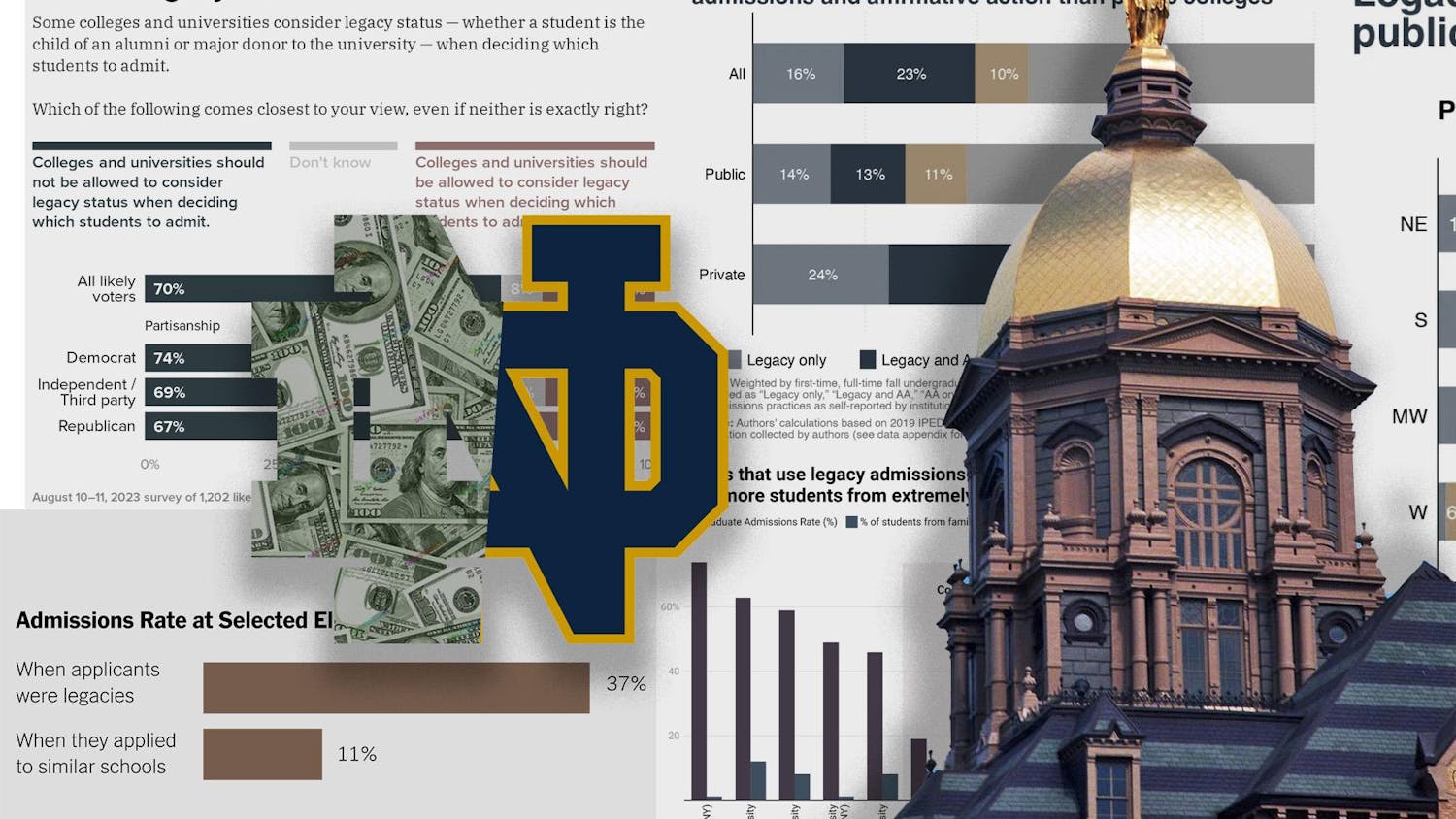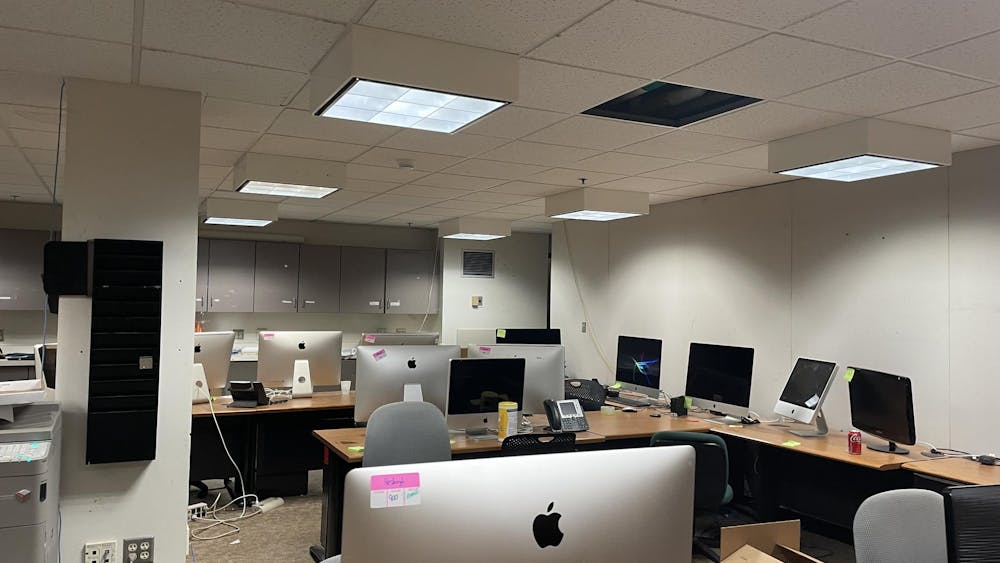There are 57 chapels on Notre Dame’s campus. Every residence hall and most academic buildings boast a space for Catholic worship, with Mass being celebrated almost 160 times per week on campus. As a Catholic university with a student population that is roughly80% Catholic, this should come as no surprise to anyone.
But what about the remaining 20% of students?
While approximately 80% of Notre Dame students identify as Catholic, Notre Dame not only accepts students of other faith traditions, but openly welcomes non-Catholic students, encouraging them to explore their own faith on campus.
In some ways, Notre Dame has met the challenge of supporting non-Catholic students, providing support for events and holiday observances upon request. Additionally, the University has built two prayer rooms on campus, offering Jewish and Muslim students a dedicated space for prayer. These rooms, located in Jenkins Nanovic Hall and Coleman-Morse Hall, provide space for students to pray in a safe, private space.
While Campus Ministry does regularly support non-Catholic organizations by sponsoring events and offering resources to club leaders, their communications to the student body rarely involve announcements of these services. Despite Campus Ministry’s mission of “cultivating the faith of all Notre Dame students,” their weekly newsletter only promoted the Jewish Club and its events three times in 2021, and events for the Muslim Student Association (MSA of ND) twice.
As a result of this lack of public support, many non-Catholic students are unaware of the faith-based resources available to them on campus. Bella Niforatos, a senior and co-president of Notre Dame’s Jewish Club, said she only recently learned of the interfaith prayer room in Jenkins Nanovic Halls.
“There is support and there are certain resources, but you have to look for them,” Niforatos said. “You won’t just happen upon them.”
During the hostage situation that occurred at a Fort Worth synagogue Jan. 15, Niforatos said she wanted to go somewhere other than her dorm room to pray for the safety of the hostages — but she didn’t know where to go.
“I didn’t want to go to a Catholic space, but I just ended up sitting by the lake,” Niforatos said. “It’s a good example of the way that people from other faith traditions here might have access to resources, but they don’t know where they are or how to get them.”
Abdulrahman Atassi, a first-year member of the MSA of ND, said he was able to access halal food in the dining hall with relative ease, but he wouldn’t have known about it if a former student hadn’t told him about the option.
Atassi praised Campus Dining’s efforts to assist him in accessing halal meals, but said he wishes the option was offered more publicly, so students don’t have to locate resources on their own.
“I feel like I’m the only person who knows about it,” he said. “The school is very ready to give students whatever they ask for, but it’s not offered directly or openly.”
Campus Ministry’s page for interfaith resources reads, “Regardless of the faith background that you bring to this place, Campus Ministry seeks to meet you where you are and to assist you as you grow here into the person that God has created you to be.”
But putting the burden on non-Catholic students to discover and access the resources available to them — when their Catholic peers receive clear and consistent guidance — does not appear to be “meeting you where you are.” The University must take the initiative to support its non-Catholic students in more proactive ways.
These students are just as much a part of the Notre Dame community as anyone else, and they deserve faith-based resources tailored to them. Speaking to this point, junior and Jewish Club co-president Blake Ziegler described the University’s obligation to non-Catholic students as a “contractual relationship.”
(Editor’s Note: Blake Ziegler is a Viewpoint columnist for The Observer.)
“Notre Dame offered me admission knowing that I’m Jewish, because my application said that I was Jewish,” he said. “And the moment that they offered me admission, it was them making an agreement that I would be able to participate in that space as who I am, as who I presented myself to be to the admissions committee, which is as a Jew. And so far, in a lot of ways, Notre Dame just hasn’t lived up to their end of the bargain.”
This lack of initiative from the University contributes to the exclusionary perception of an “archetypal” Notre Dame student — one who is, mainly, Catholic. Countless practices across campus, even outside of faith life — professors opening classes with prayer, resident assistants in some dorms being required to attend dorm Mass, large campus events such as Commencement or Welcome Weekend being celebrated with Catholic services, every classroom having a crucifix — point to the pervasive belief that Catholicism is the “default” at Notre Dame.
We’re not asking Notre Dame to strip itself of its Catholic identity or uproot its deep Catholic tradition. In fact, Ziegler said he appreciates the University’s commitment to Catholic values, especially in regard to education.
“That’s part of the reason I chose Notre Dame, because I think Catholic education is a good education,” he said. “Just because it’s an education rooted in a religion that’s not my own doesn’t mean I can’t benefit from it, doesn’t mean I can’t find value in it. I think the liberal arts emphasis of Catholic education is amazing, and I think its emphasis on faith has been hugely beneficial for my own faith and spiritual life.”
We instead ask the University to move beyond serving the “default” Notre Dame student in its offerings of faith-based resources. When asked what the University can do to support non-Catholic students moving forward, Niforatos and Ziegler both emphasized the importance of forming a stronger Jewish community on campus.
One way to build community, they both suggested, is to establish a chapter of Hillel International at Notre Dame. Hillel is a community-based, educational organization dedicated to uniting Jewish students across the country. Chapters have previously been established at other Catholic universities, such as Georgetown and Boston College.
Graduate student and MSA of ND board member Haleemah Ahmad also spoke to the importance of creating more prayer rooms on campus so that Muslim students can pray more easily. Even though there are currently two, she said she often finds herself running to Jenkins Nanovic on the far end of campus in between classes to pray — ultimately making her late to class.
“We understand that the school cannot make the class timetable in line with our prayer times, but at least there should be a prayer room, no matter how small, in every building where students have classes,” she said. “It doesn’t have to be a mosque; it can just be a prayer room that anybody of any faith can make use of.”
Students placed just as much emphasis on non-physical and non-monetary support. Even if Notre Dame cannot offer financial support to non-Catholic student organizations, the University and Campus Ministry can still act as a platform for these students’ causes and issues.
According to Niforatos, this type of support can come in many different forms: Campus Ministry promoting non-Catholic organizations and their events, leaders including antisemitism in their discussions of social issues, professors thinking twice before they ask their students to bow their heads in Catholic prayer before class.
Atassi also pointed out the importance of bringing awareness to the Muslim community on campus, saying that Muslim students might practice their faith more publicly if others were educated about it.
“Theoretically [we] could just step outside and pray, but it’s not always comfortable to pray in public because people aren’t familiar with what’s happening,” he said. “When I stepped into the grass to pray one day, a stranger asked me if I was OK because I was kneeling on the ground.”
While Atassi said increasing visibility is partly the responsibility of the MSA of ND, he also pointed out that they’re still students, with classes and activities, and the University should step up to increase awareness of Muslim traditions.
As a community, we are made stronger by the sharing of faiths and the coming together of different worldviews, a strength that should be recognized and celebrated by creating accessible safe spaces and equitable resources for all faith traditions. After all, catholic means universal.
Observer Editorial: Meeting non-Catholic students where they are
The views expressed in this column are those of the author and not necessarily those of The Observer.









